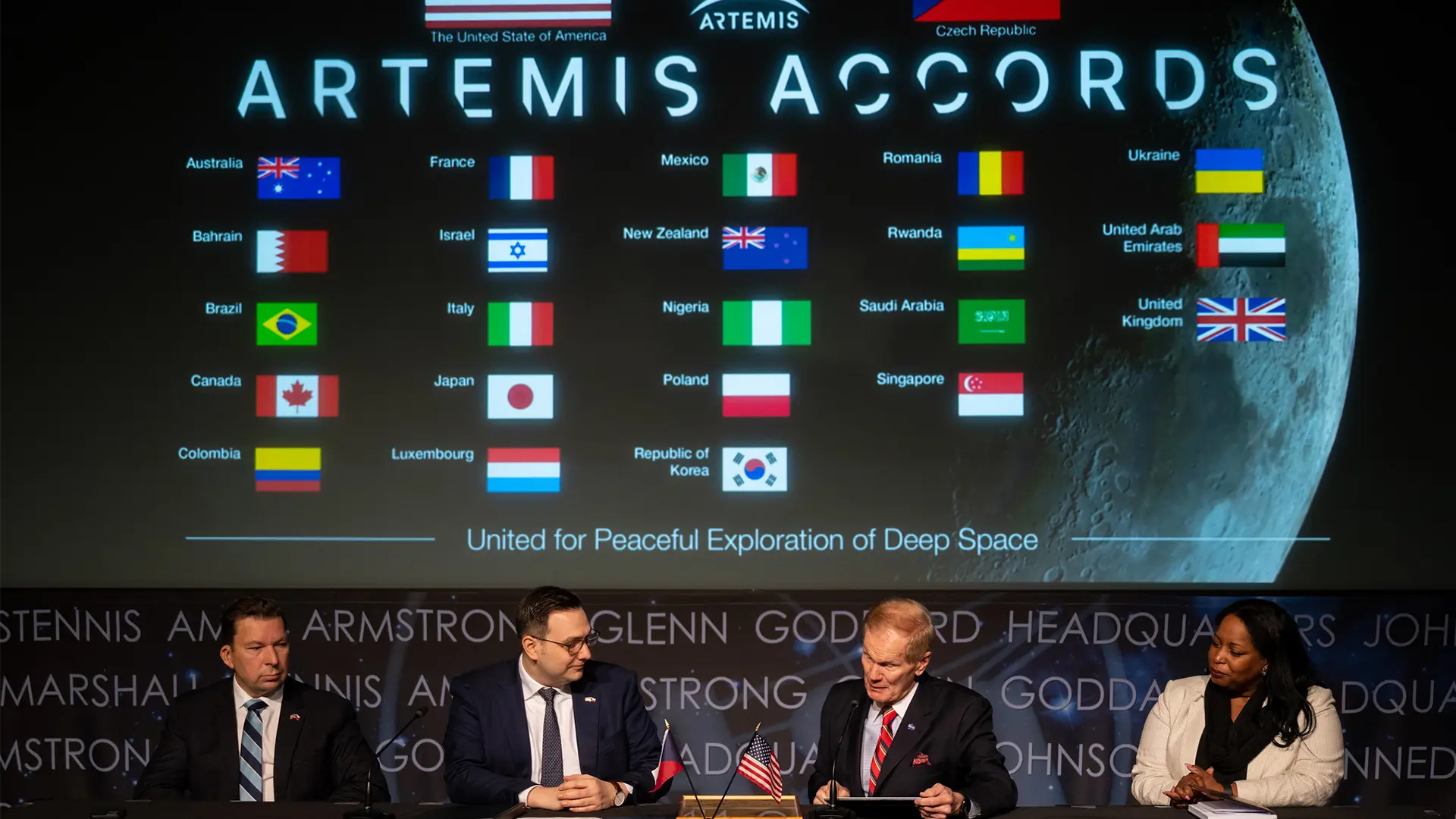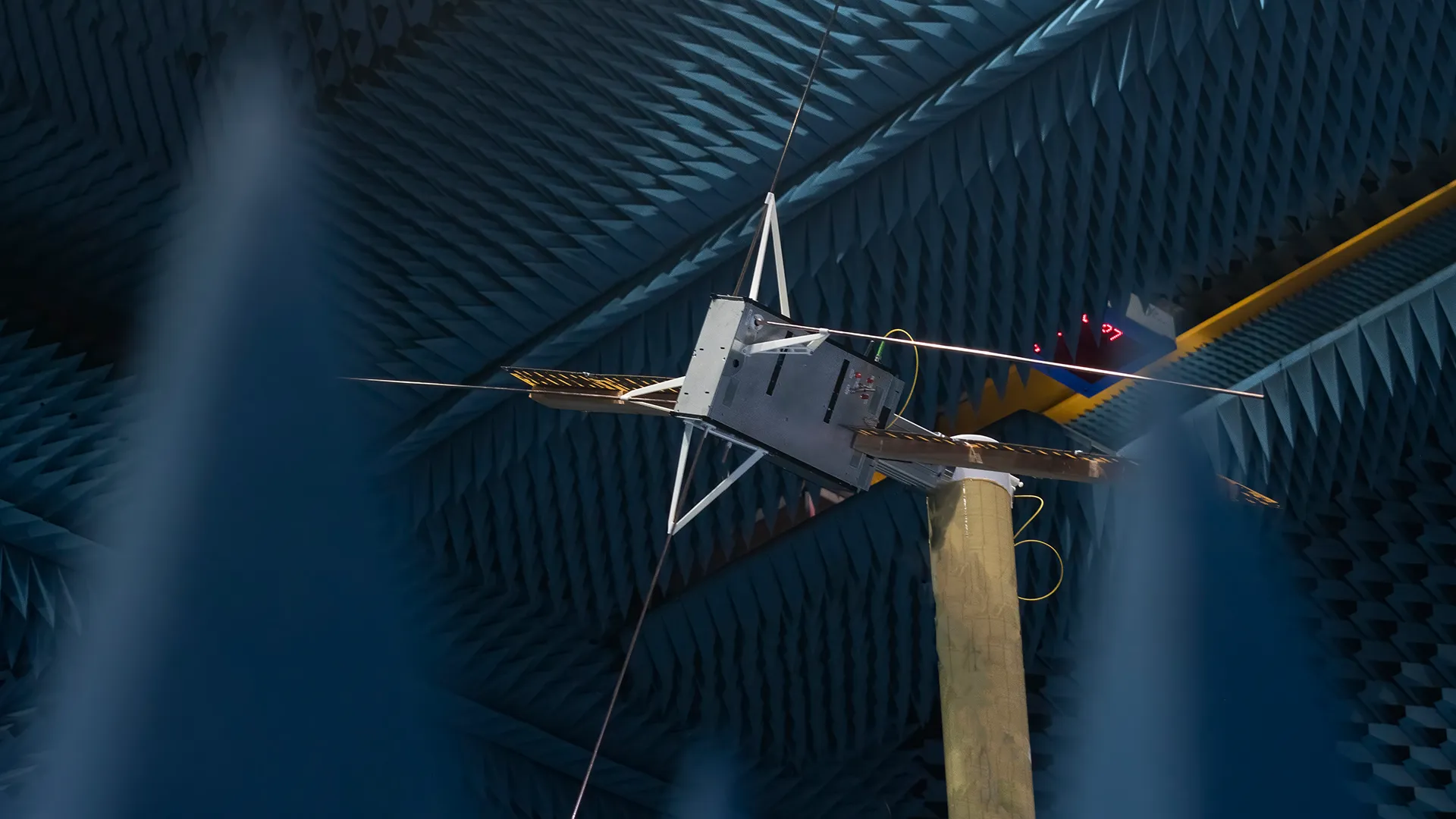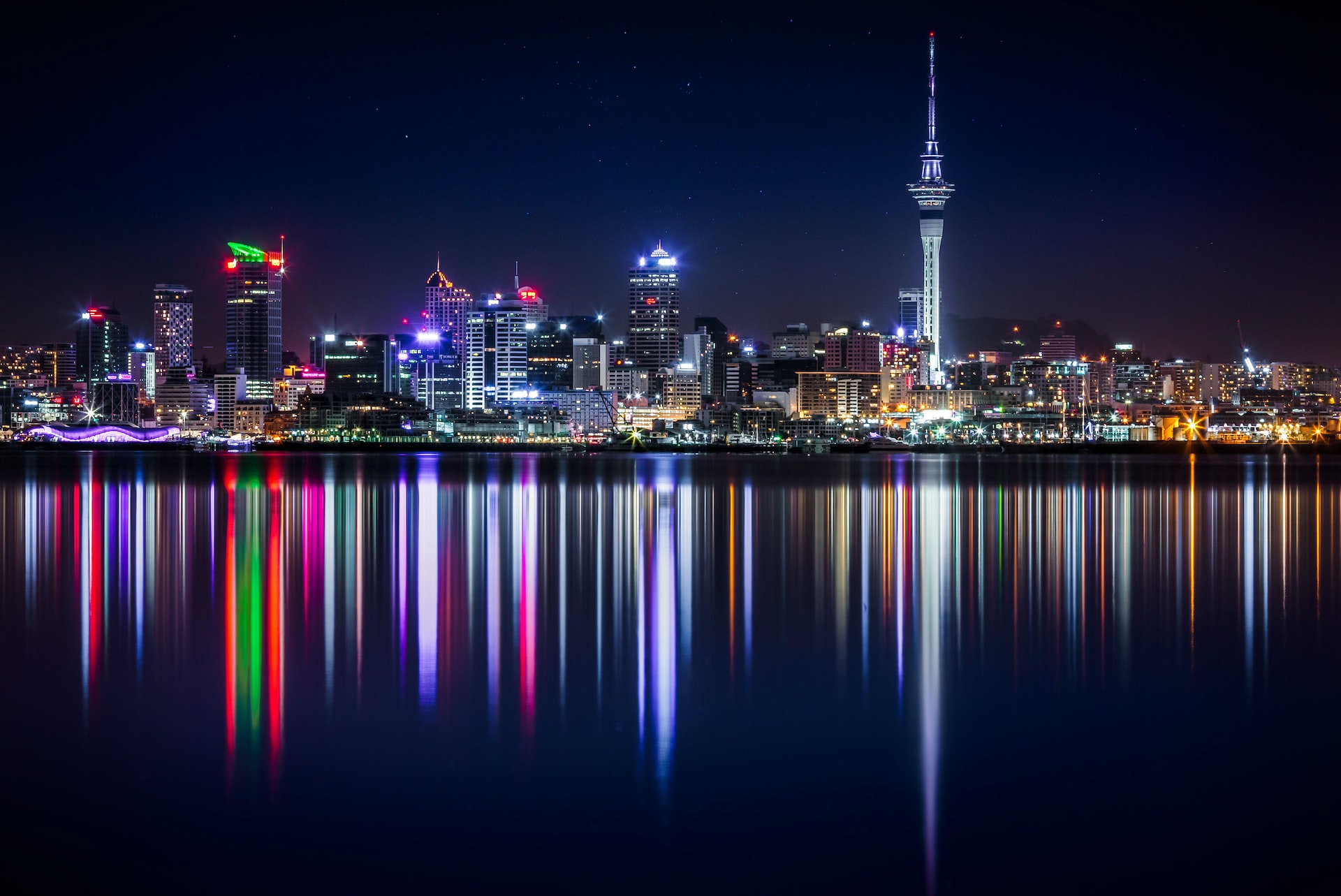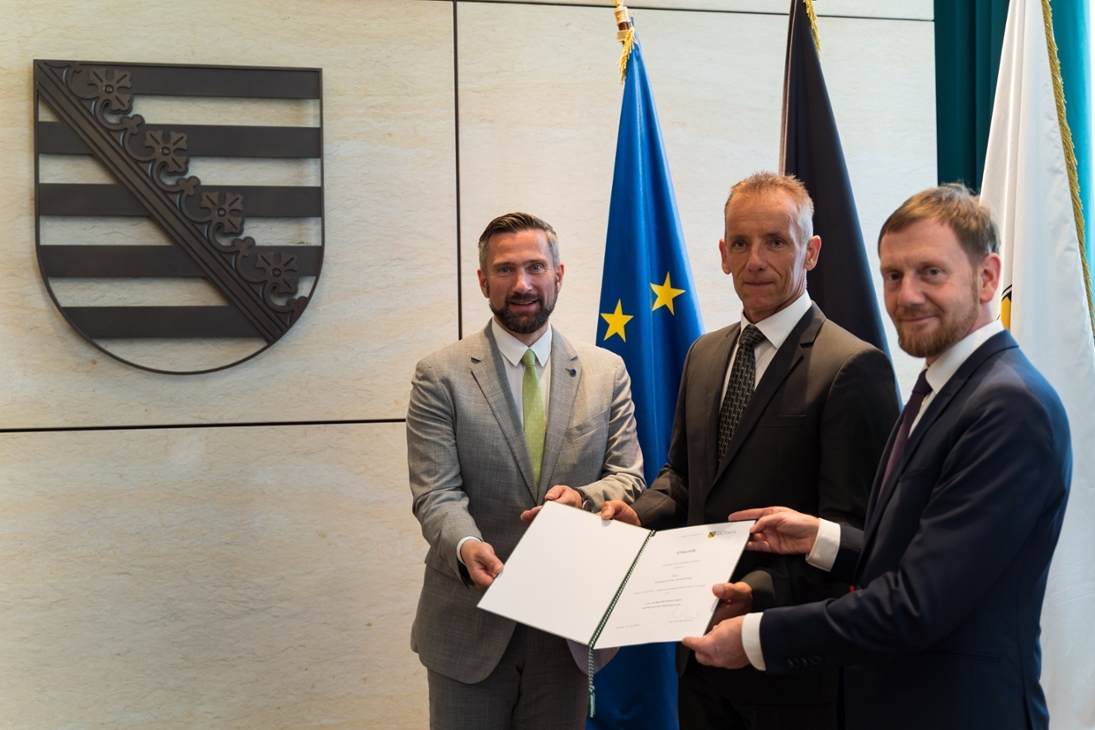
Space policy without vision: A comment on the German government's new space strategy
Published on Fri, 29.09.2023 – 13:08 CEST in Politics, covering VerwaltungThe previous Space Strategy of the German government dates back to 2010 and can be considered outdated. Now, the German cabinet has adopted a new strategy that takes into account the new conditions in NewSpace. We have taken a look at it, summarized the most important points and come to a sobering conclusion in this comment.
First of all, anyone expecting the German government's new Space Strategy to generate the same kind of euphoria as NASA's Apollo program in the past will be largely disappointed. Although many relevant points are addressed, the strategy paper is only rarely specific. But let's take it one step at a time.
The German Federal Ministry of Economics and Climate Protection (BMWK) is responsible for the Space Strategy. In his foreword, Vice Chancellor Robert Habeck (Bündnis 90/Die Grünen) discusses the changed conditions under which space travel takes place today. These are of a geopolitical nature on the one hand, and of an economic and technical nature on the other. Space-based applications continue to find their way into our daily lives, and in some cases have long since become indispensable. Satellites, for example, are already part of the critical infrastructure that requires special protection. According to Habeck, space-based infrastructures are even essential for Germany's future viability. As a result, he said, Germany wants to cooperate more closely at the European and international levels. The ability to make contributions and enter into partnerships should be ensured through national activities. In addition, the combination of government programs and market-based competition is to be "recalibrated". This is intended to make the best possible use of the economic dynamics in aerospace.
Quo vadis, German spaceflight?
The first chapter of the Space Strategy resembles a well-delivered campaign speech. Seven pages summarize the current state of affairs. For a better understanding, for example, it lists the effects that the abolition of space travel would have on everyday life. As expected, it is emphasized that Germany has an excellent research landscape. However, the German government is aware that "new times and a new relevance of space infrastructures also require new measures". Therefore, the government wants to support flexible options and innovative approaches. The goal is to meet future needs. To this end, the German government wants to make its space activities "ambitious, demand-oriented and sustainable in view of the current dynamics." This ruthlessly reveals the real shortcoming: There is no vision in German space policy.
Without a clear goal, the journey into space becomes an odyssey
In his speech to the U.S. Congress in May 1961, John F. Kennedy advocated getting people to the moon and back safely as early as the 1960s. Elon Musk, who is undoubtedly a feisty personality, never tires of wanting to develop humanity into an interplanetary species. After the successful launch of SpaceX's Demo 2 mission in May 2020, arguably the most controversial politician in U.S. history, Donald Trump, proclaimed that you can't be No. 1 on Earth if you're No. 2 in space. And, significantly in terms of a vision, that they won't be number 2 anywhere.
These are certainly big words, and they do not apply one-to-one to the German mentality. But they underpin a claim: "We want to be the ones who make the impossible possible. And we want to be the best at it. Such a claim would also have been a good thing for Germany as a location for the aerospace industry. While NASA wants to go back to the moon and Musk wants to go to Mars, the German government struggles to articulate that Germany wants to go into space.
Thought European, done halfway
At first glance, the demand to launch German spacecraft and, in the future, German astronauts into space from German soil using German rockets would seem to contradict the European idea. But only at first sight. This does not mean that these competencies can only be used by Germany. After all, not depending on the capabilities of third parties for every project would be advantageous for European spaceflight as a whole. For this to happen, however, it would have been necessary to state clearly at least once: "Germany wants to go into space with it's own capabilities and become a leader in space." But nothing of this can be read with such clarity. Instead, the German government hides behind the European idea, which is reflected in the Space Strategy as ESA, EUMETSAT or EU.
The German Space Strategy is a big wish list with no obvious roadmap
The introductory chapter of the Space Strategy describes the current transformation of modern space. That's a good start, but nothing more. Chapter 2, which is devoted to a total of nine identified fields of action, could have been more specific. In each of these areas, goals and measures are presented, as well as selected key projects that will be monitored by the BMWK. However, it takes a lot of patience to search for passages that are not ambiguous and/or poorly worded. This reduces the actual benefit of a strategy to absurdity. In its present form, the German Space Strategy is more of a wish list than a road map.
| # | Field of action |
|---|---|
| 1 | European and international cooperation |
| 2 | Space as a growth market - high-tech and NewSpace |
| 3 | Climate change, resource and environmental protection |
| 4 | Digitization, data and downstream |
| 5 | Security, Strategic Capacity and Global Stability |
| 6 | Sustainability and safe use of space |
| 7 | Research in space |
| 8 | International space exploration |
| 9 | Space in dialogue and attracting talents |
Goals and measures are not the same
The German government would have been well advised to be as specific as possible. The need for SMART goals is something management consultants can sing a song about. How to do this can be found in any strategy development guide or on the pages of the German Ministry of the Interior and Community (BMI). There it says, for example: "The SMART rule is a method for checking that goals are clear and specific. Goals must be specific, measurable, attractive, realistic and time-bound ". As advantages the BMI mentions the low (time) effort and the concrete goals as a result. However, the Space Strategy contains hardly any of these. In addition, goals (what is to be achieved?) and measures (how is it to be achieved?) are often mixed or confused.
German Space Day is scheduled, but the space industry is being neglected
The Space Strategy thus fails to provide answers to many crucial questions. This is particularly noticeable in the case of the key projects, which the strategy itself states will be monitored. A whole page is devoted to a European launcher competition (1) as a key project, but there is no mention of how this will be structured. The same goes for participation in international missions (2) and the small satellites initiative (3).
The situation is somewhat better with regard to the development and expansion of national space situational capabilities (7), space traffic management (8), excellent research in low Earth orbit after the end of the ISS (10) and explaining aerospace (12). The Space Strategy becomes concrete at the Space Innovation Hub (4), which is a platform designed to promote exchange between public-sector demand drivers and providers of space services. The precise measurement of emissions from space (5), cloud platforms for climate and environmental data (6), and experiencing space travel (13) provide a glimpse of the future. But in the case of the latter, the question arises as to why nails have already been put to heads.
Enthusiasm for spaceflight by copy & paste?
For example, a German Space Day is to be held in 2025. The idea is that all of the space sites in Germany will open their doors to the general public on the same day at the same time. The strategy also provides the catch to this seemingly clever measure. Among other things, it is intended to communicate the broad regional distribution of German space activities across all of Germany's federal states. A day organized in this way may be an experience for the general public in Bavaria, Bremen or Berlin. However, anyone who lives in a federal state in which the German space industry is under-represented will be left out in the cold. This raises the question of how to increase public understanding of the importance of spaceflight. At the end of the day, copying the Open Monument Day will probably be a manageable success. At worst, it will fail to serve STEM.
Motivate, inspire, inform - long-term and continuously
Enthusiasm and long-term engagement with a topic cannot be achieved through actionism. Rather, it takes patience to keep the audience interested over a long period of time. And above all, it needs a well-told story. It is far too short-sighted to think that nothing more needs to be done because "interest in space travel and outer space are particularly well suited to generating enthusiasm for education and careers in STEM fields at an early age."
When there is an urgent need for skilled workers, especially in technical and scientific fields, the inspirational power of space on young people is a key factor.
German Space Strategy, Page 5
It is clear that the space industry will not be left out of the shortage of skilled workers. Here, too, the competition for the best brains will be won by those who can make the most convincing case. It is not only a pity that the German government has missed the opportunity to support German space companies with an ambitious space strategy at the international level. It also contradicts its own claim to strengthen Germany as a space location and make it more visible. In the media, US space is clearly the dominant theme, with the NASA logo appearing everywhere. Even if many members of the younger generation do not know who or what NASA is or does. SpaceX, on the other hand, is well known even to those who are not fans of Elon Musk. This may be due to the (technical) milestones it has achieved, but it is also the result of a confident presence and clever storytelling.
The first man on Mars could be from Germany - but it won't be
With political backing, Elon Musk's company managed to end a years-long drought in U.S. spaceflight. Robert Behnken and Douglas Hurley were hailed as heroes after their launch to the ISS. The Americans are also focusing on crew diversity. It is already clear that Artemis 3 will be the first non-white man and the first woman to fly to the moon. In Germany, this is as distant as the moon is from Earth. So far, only 13 Germans have been in space, and not a single one of them was a woman. With Amelie Schoenenwald and Nicola Winter, at least two German women have made it into the ESA astronaut reserve. It remains to be seen whether they will ever be allowed to go into space - although it would be more than desirable.
However, they are positioned as shining examples in space exploration strategy. Without wanting to discredit them: But for what? For the fact that despite their outstanding achievements (2 out of 23,000), there's only a seat on the bench as a reward? If the goal is to inspire young talents for the field of space exploration in general, there are numerous better examples in the German NewSpace ecosystem. Because the problem with astronautic space travel remains its exclusivity. Since Yuri Gagarin became the first human to venture into space on April 12, 1961, only 639 others have crossed the magical 100 km threshold. So, after more than six decades, there are fewer people who have been to space than there are currently sitting in the German Bundestag. This is unlikely to generate much enthusiasm.
All that remains is the hope for the involvement of the aerospace industry
In the end, there's a suspicion that the new Space Strategy is the result of a neglected issue. While political Berlin likes to adorn itself with the successes of the German aerospace industry, concrete support falls short. This is evident not least in the budget allocated for national space activities. Just in August 2023, 45 German aerospace companies demanded in an open letter that the budget not be cut. A little under 314 million euros are earmarked in the 2024 budget – more than 15 percent less than the previous year. The savings on a national level do not offset the fact that Germany is the largest contributor to the ESA with 3.5 billion euros (2023-25). At least not until European space agency tenders are structured in a way that regularly excludes young companies. It's precisely startups that bring dynamism to the industry with their unconventional ideas.
The strategy paper is particularly undermined by a conclusion from the Federal Ministry for Economic Affairs and Energy (BMWK) itself. This was drawn in a November 2022 article titled "Impulses for German Space Policy". It states, "Germany must set itself ambitious goals in its new Space Strategy, for which the right course must be set now."
There is reason to fear that this has not happened. So, all that remains is to hope that the actors in the NewSpace ecosystem are not discouraged by the missing vision in German space policy and that they soon achieve their self-set goals. After all, these goals are thoroughly SMART and are already generating enthusiasm.
Note: This comment reflects the author's personal opinion.













